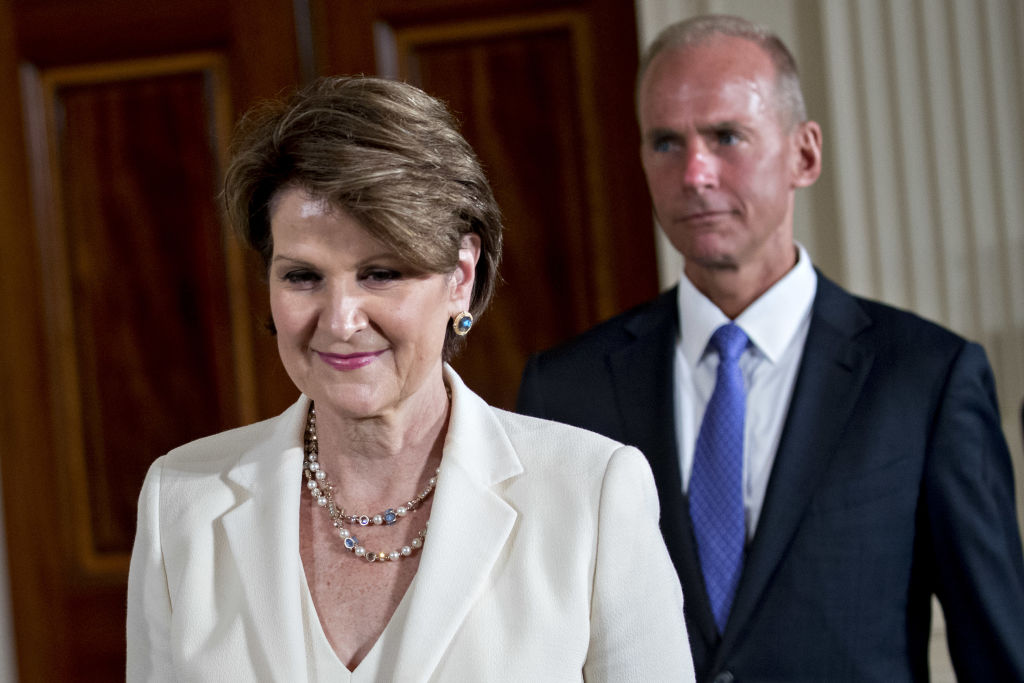For its third meeting, the National Space Council chose the White House as its venue. This allowed President Trump to stop by the meeting to sign a policy document on space-traffic management and also share a few thoughts. This event was supposed to focus on the relatively sedate topic of space debris, but the freewheeling president had other ideas.
Among his remarks, Trump declared that he was pressing ahead with the creation of a Space Force to become the sixth branch of the US military. Additionally, he mused about the high cost of rockets built by Boeing and Lockheed Martin and suggested they should not work together "because the pricing only goes up."
Space Force
Addressing the space council, with its titular head Vice President Mike Pence standing at his side, Trump said he was directing the Department of Defense and Pentagon to immediately begin the process necessary to establish a Space Force as a distinct entity outside of the Air Force.
"We are going to have the Air Force, and we are going to have the Space Force, separate but equal," Trump said. "It is going to be something. So important. General Dunford [Joseph Dunford, chairman of the Joint Chiefs of Staff], if you would carry that assignment out, I would be very greatly honored, also. Where's General Dunford? General? Got it?"
Dunford replied, "We got it."
But while Dunford nodded his assent, both the Air Force and the Secretary of Defense, James Mattis, have signaled their disapproval for moving military spaceflight activities out of the Air Force and into a new branch of government. "I oppose the creation of a new military service and additional organizational layers at a time when we are focused on reducing overhead and integrating joint warfighting efforts," Mattis wrote in October.
Although there is some Congressional support for the Space Force, it is not clear how widespread the support is. Some key Democrats oppose the idea, including Florida Senator Bill Nelson, who said via Twitter, "The president told a US general to create a new Space Force as 6th branch of military today, which generals tell me they don't want. Thankfully the president can't do it without Congress because now is NOT the time to rip the Air Force apart. Too many important missions at stake."
Break up ULA?
Trump also offered some thoughts on United Launch Alliance, the rocket company jointly owned by Boeing and Lockheed Martin. "I don't like when Boeing and Lockheed get together because the pricing only goes up," Trump said. It appeared to be something of a joke, but then he later added, "I don't know. I don't love that stuff. We're going to have to talk about that, your joining those two companies."

The chief executives of Lockheed Martin (Marillyn Hewson) and Boeing (Dennis Muilenburg) were in the audience. Referencing both of them (who sat side by side), Trump said, "Look at them; they're sitting together. Oh, it's no wonder we don't get the pricing we want. Huh? Stay apart. Stay apart. Don't get together. Stay apart."
The president appeared to be confused about United Launch Alliance, which was formed in 2005 and builds the Atlas and Delta rockets used for military and commercial launches. Of ULA, Trump said, "That's a combination of Boeing and Lockheed on the Space Launch System, SLS." However, ULA is distinct from Boeing's space division, which is building the Space Launch System rocket for NASA's human exploration program.
Trump is correct that the price of the SLS rocket only keeps going up—development costs are running more than $2 billion a year, and the first launch probably remains at least two years away. However, it is unfair to pin that on ULA, which is not involved in the NASA booster program and has faced pressure to make its rockets more competitive after SpaceX's Falcon 9 rocket entered the market in 2010.
There are some in the aerospace community who believe ULA would be better off if it spun away from its parent companies and Chief Executive Tory Bruno was allowed to fully implement his plans to increase ULA's competitiveness by developing the Vulcan rocket and a re-usable upper stage. It is not clear whether Trump was suggesting that this happen, although one space policy source familiar with his comments said of the president, "He really does believe that big companies 'colluding' is bad for the government customer."
[contf] [contfnew] 
Ars Technica
[contfnewc] [contfnewc]







